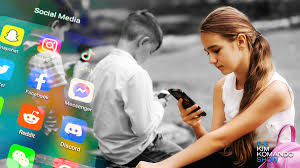
INDIANA – There’s no easier way to keep your kids occupied than by handing them a laptop, tablet, or smartphone.

But while children love to play games and message their friends, there are hidden dangers parents should be aware of before allowing their children unlimited access to social media.

Online privacy expert Trevor Cooke from EarthWeb discusses seven tell-tale signs of social media addiction in kids and provides strategies to address it.
1. Check Time Spent on Social Media
Is your child using platforms like Instagram or Facebook at all hours of the day and night? Take notice when hobbies, studies, and social interactions take a backseat to scrolling through feeds. Parents can check the time tracking features on their child’s phone to gauge how many hours a day are spent on social media apps.
2. Obsession with Likes and Shares
Does your child exhibit an unhealthy preoccupation with the number of likes, shares, and comments they receive? This constant need for validation could impact their self-esteem and mental health. It’s important to let them know that these metrics have nothing to do with their worth or how much others like them.
3. Mood Swings
Does your child exhibit irritability, anxiety, or sadness when not using social media? This behavior could be a sign of withdrawal symptoms, which are indicative of addiction.
4. Decline in Physical Activity
Your child may be foregoing physical activities and outdoor play to spend time on social media. A sedentary lifestyle can adversely affect their physical and mental well-being, so try to encourage your child to put their device down and spend some time outside. Activities like family hikes or joining a sports club could help encourage this.
5. Neglect of Responsibilities
Children addicted to social media sometimes neglect responsibilities such as homework, chores, or other obligations. This can have long-term consequences on their academic and personal development. It’s important to encourage them to complete all their other obligations before they open any social media apps.
6. Disrupted Sleep Patterns
Excessive time on social media – especially before bed – can disrupt sleep patterns in children. The blue light given off by screens can fool the body into thinking it is still daytime, which means it doesn’t produce the hormones that prepare the brain for sleep. Lack of sleep can affect their mood, academic performance, and overall health.
7. Social Withdrawal
Kids addicted to social media may withdraw from in-person interactions, preferring online communication. This can affect their social skills and lead to feelings of isolation, as they get left behind by peers who get the correct amount of face-to-face interaction. You can encourage your child to interact more in person by helping facilitate get-togethers, like hosting their friends at your house or giving your child a lift to somewhere they can hang out in person with their friends.

How to Prevent or Remedy the Situation
As a parent, you should set clear boundaries and monitor your child’s screen time. Encourage other interests and hobbies, and make time for family/social activities that don’t involve screens. Trevor says, “Explain why using social media responsibly is important. If necessary, seek professional help to guide your child towards a balanced relationship with technology.”

Fostering an open conversation with your children about why too much social media is bad for them will help set them on the road to responsible social media use. Now you know how to identify and rectify social media addiction in children, and you can help your kids enjoy all the benefits of social media without falling prey to its pitfalls.
Information: EarthWeb



